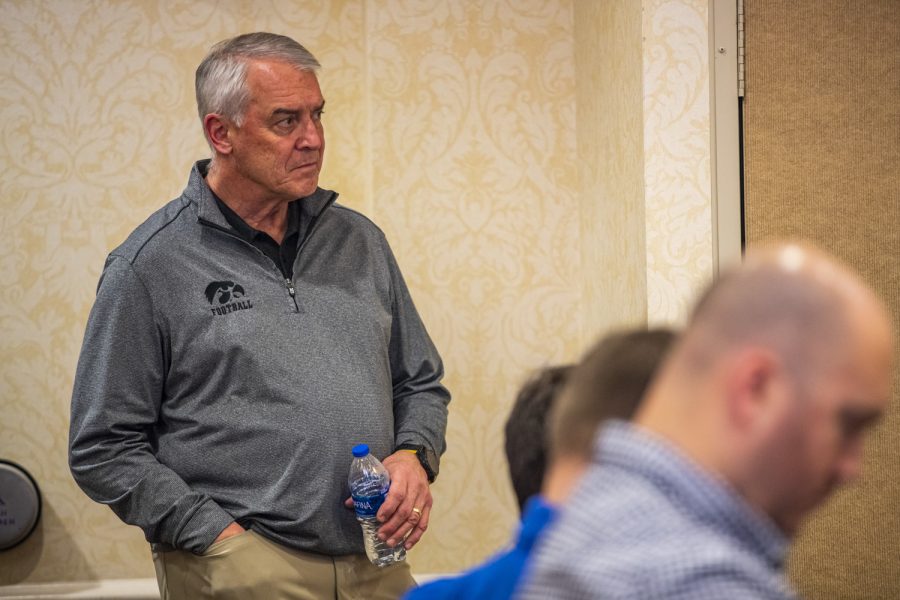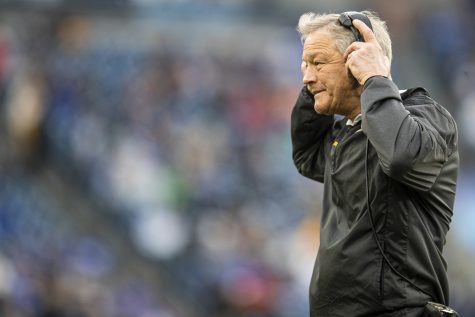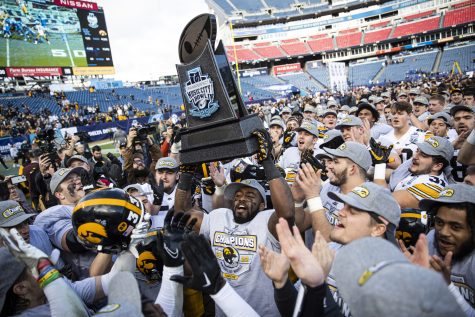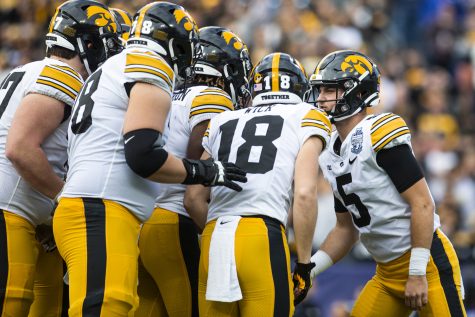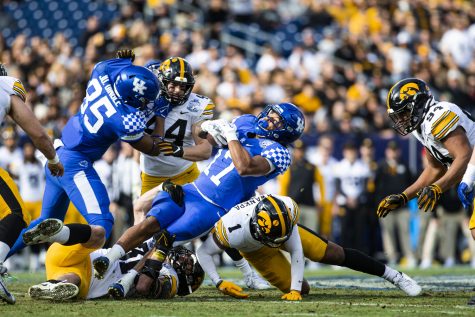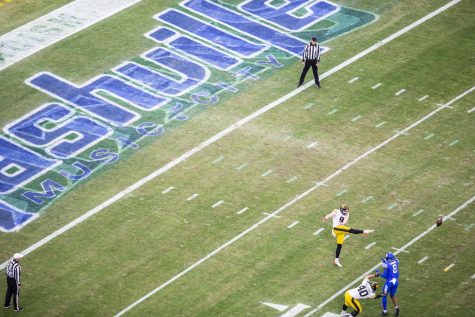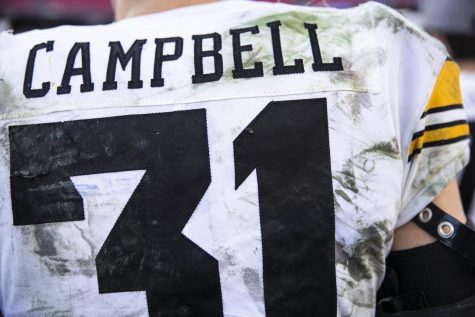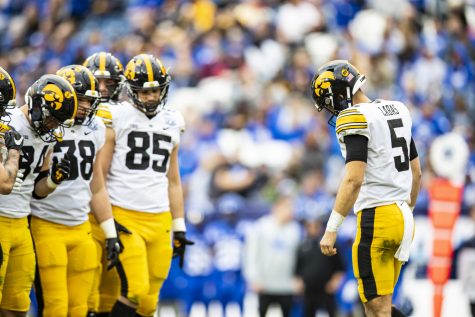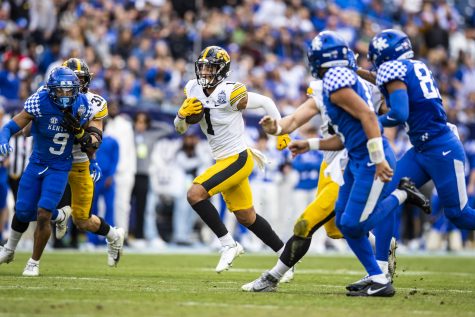Iowa athletic director Gary Barta reiterates support for Iowa Swarm Collective despite differing opinions
The Iowa Swarm Collective publicly voiced its frustrations with the Hawkeye athletic department earlier this week.
Iowa athletic director Gary Barta listens to Iowa head coach Kirk Ferentz speak during a joint coaches press conference for the 2022 TransPerfect Music City Bowl at Gaylord Resort and Convention Center in Nashville on Friday, Dec. 30, 2022.
December 30, 2022
NASHVILLE, Tenn. — The Iowa Swarm collective — a group that helps student-athletes leverage name, image, and likeness opportunities — grew frustrated with Iowa Athletics earlier this week, noting a lack of support from the department.
According to 24/7 Sports, Iowa Swarm CEO Brad Heinrichs said the collective wants to email and educate season-ticket holders and donors, but Iowa Athletics refused to give out that information. Heinrichs also said Iowa Athletics would not provide any other assistance until the Swarm became compliant with Title IX.
Iowa athletic director Gary Barta rebuffed both of those assertions on Friday afternoon at the Gaylord Opryland Hotel and Convention Center in Nashville. Barta spoke with reporters following press conferences with head coach Kirk Ferentz, offensive coordinator Brian Ferentz, and defensive coordinator Phil Parker.
Barta said the Iowa athletic department was immediately supportive of the Iowa Swarm and the entrepreneurship of its student-athletes. He also acknowledged there are differences of opinion between the Swarm and the athletic department, which includes giving out personal information of donors and season-ticket holders to a third-party.
“The only real difference that we have is me turning over the personal information of our season-ticket holders and our donors,” Barta said. “And we’re not going to do that. We haven’t done it for anyone else. I’ve talked to a lot of ADs around the country, and I still haven’t heard one school that has done that. I’ve heard from plenty of season-ticket holders and donors that say, ‘You better not give away my personal information.’ So, we won’t do that. But we’ll continue to support the Swarm.”
Heinrichs tweeted about other athletic directors — including Ohio State’s Gene Smith and Michigan’s Warde Manuel — sending emails to season-ticket holders this week, stating “Hmmm…both tOSU and Michigan’s ADs supporting their NIL programs…Santa, I hope you got my list…”
Hmmm…both tOSU and Michigan’s ADs supporting their NIL programs…Santa, I hope you got my list… https://t.co/BN4998rn3o
— Bradley Heinrichs (@HeinrichsBrad) December 25, 2022
Gene Smith, tOSU AD, sent out an email this week to all their season ticket holders encouraging them to donate to their 4 different collectives. I bet they appreciated that. @IowaSwarm
— Bradley Heinrichs (@HeinrichsBrad) December 25, 2022
Smith and Manuel emailed season-ticket holders and donors from a university email, however, and did not give out the email list to their collectives. Barta said Friday he is willing to email season-ticket holders and donors on the collective’s behalf, but he reiterated he will never give out the personal information to a third party.
Barta added the athletic department has more flexibility now that the Iowa Swarm is a corporate sponsor of Hawkeye Sports Properties. Iowa Athletics can promote the Swarm within NCAA compliance rules, the same as any other sponsor.
“We want to promote the program,” Barta said. “Whether it’s giving to the Swarm or giving to the I-Club or facilities, whatever it is, I’m on board and I’ve been encouraging donors to give to the Swarm.”
Barta released a statement on Dec. 27, three days after Heinrichs voiced his frustrations on Twitter, outlining how the athletic department can support the Swarm.
An open letter from Gary Barta: #Hawkeyes pic.twitter.com/9xChmFQw24
— The Iowa Hawkeyes (@TheIowaHawkeyes) December 27, 2022
Barta stated on Dec. 27 there are limitations on how Iowa Athletics, and athletics departments across the country, can help collectives because of NCAA compliance and Title IX law.
On Friday, Barta recognized the Iowa Swarm — which supports football, men’s basketball, and women’s basketball student-athletes — does not have to adhere to gender equity rules. But Iowa Athletics, which just settled a Title IX lawsuit in 2021, will stay committed to equal opportunity.
“The Swarm has no responsibility for gender equity, I fully understand that I acknowledge that,” Barta said. “Everything we do, we think through that lens of making sure we’re fair to men and women. When it comes to name, image and likeness, we’re going to continue to just make sure we’re offering as much fairness to men and women as we can.”
Iowa football released a video on Dec. 28 that featured Kirk Ferentz encouraging fans to donate to the Swarm. Multiple other head football coaches, including Iowa State’s Matt Campbell and Kentucky’s Mark Stoops, have recorded videos encouraging donations.
Swarm With Us. #Hawkeyes
— Hawkeye Football (@HawkeyeFootball) December 28, 2022
“I think it’s a sign of the times,” Ferentz said in response to a question about the importance of NIL collectives on Friday. “There’s a lot of changes in college football right now. That’s something that’s going to continue to change. We’re maybe at right now probably way different than six months ago, and it’s going to continue to evolve. Just like a lot of things that are on our horizon, if you will, in college football. There will be another time for that. Right now, we’re just trying to kind of focus on Kentucky, got our hands full there.”
Within the last year, the NCAA has changed rules on NIL and the transfer portal without specific guidance or rules, leaving schools to scramble to figure out what is within compliance.
“It’s as though somebody said, ‘Let’s go ahead and allow this, and we’ll figure out the rules later.’” Barta said. “And that’s been the hardest part of this. One of the things is to have the same rule nationally, in every state, that would be helpful.”
Barta also pushed for the NCAA to allow athletics departments to run collectives themselves, eliminating the third-party concept. While the idea would include athletics departments giving student-athletes money, Barta said it would likely be in the form of financial aid.
He added the concept of financial aid has changed over the years — it was first full tuition scholarships, then it changed to cost of attendance. Most recently, athletic departments have been authorized to give up to $5,980 per year to student-athletes on top of cost of attendance in the form of supplemental academic support.
“I personally think, you know, having the concept of collective having the ability for athletic departments to run them,” Barta said. “So that we don’t have to have this third-party that we’re trying to figure out. … We need something that just takes the free agency, no rules concept out of this.”



